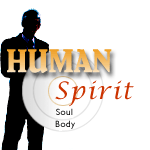The Human SpiritExegetical and Lexical Word Studies
We are not surprised to find that this threefold organization (of human nature), sanctioned by such scriptural authority, was generally recognized by the Early Fathers (Lightfoot, Notes, 89). Greek PhilosophersAmong the Greek philosophers there was only a realization of man as a dichotomy: body and soul. The spirit, which is understood only by divine revelation, was not grasped by the natural Greek mind. Plato and the Greek philosophers were dichotomists only. Every man, Plato taught, consisted of two parts, a mortal body and an immortal soul (Heard, 60). To harmonize Plato and St. Paul together is impossible….The pneuma (spirit) of St. Paul is unknown to Plato. How could it be otherwise (Ibid., 59)? The prevailing dichotomy of body and soul rests on an old Protagorean system of couples of logical antitheses and opposites. Thus, mind and matter, finite and infinite,…were supposed to be entities co-eternal with God. These…supposed man to be made up of two parts, the reasonable soul and human flesh. The division has come down unchallenged to our day, and little modified even by those who recognize the trichotomy of Scripture (Ibid., 7). Greek FathersThe Greek Church Fathers of the second, third, and fourth centuries readily understood the true meaning of pneuma. Irenaeus, Justin Martyr, Clement of Alexandria,...Gregory of Nyssa, and Basil of Caesarea, all note the distinction of soul and spirit, and designate the spirit as that which bears the truest image of God (Ellicott, Destiny of the Creature quoted by Heard, 5fn.). ApollinarisIn the fourth century, Apollinaris (or Apollinarius), bishop of Laodicea taught the deity of Christ but denied the complete humanity of Christ. Christ had a human body and soul, but the Holy Spirit substituted for the human spirit. This led to Christological controversy. The Apollinarian theory…not only derogates from His perfect manhood, but also tends to throw confusion on the whole subject of the relation of the human spirit to the divine (Heard, 152fn.). Latin FathersIn the controversy with Apollinaris, the scriptural view of the tripartite nature of man was affected. The trichotomic view, after prevailing in the first two centuries of the church, came into discredit…among the orthodox teachers of the fourth and fifth centuries (Delitzsch, 106). Although the Greek Fathers were clear, the Latin Church and Church Fathers, including Augustine, were the first to suffer in this matter partly due to a difference in language. Pneuma was caught by the Greek, but lost or neglected by the Latin fathers. The Latin language (lacked) the precision of the Greek, and spiritus and anima never acquired the same precision of meaning as pneuma and psyche (Ellicott, Destiny of the Creature quoted by Heard, 5fn.). The dichotomy of man into body and soul became the prevailing view throughout the West….In plucking up the tares,…the Latin Fathers had plucked up the wheat as well (Heard, VII, VIII). The dominant place occupied by Augustine helped to perpetuate the dichotomous view. Augustine reigned as a Church teacher without a rival not only up to, but even two centuries after the Reformation (Heard, VIII). Calvin and Reformed TheologyCalvin, in his teaching, continues the view of man as a dichotomy without a distinction between soul and spirit. He says, When spirit is used by itself, it is equivalent to soul….Christ in commending His spirit to the Father, and Stephen his to Christ, simply mean that when the soul is freed from the prison-house of the body, God becomes its perpetual keeper (Calvin, Institutes, 1:15:2). Calvin views the spirit as a sub-category of the soul. Of the Biblical expression spirit, Calvin says it refers to that part of the soul which has been renewed or regenerated so as to bear the image of God (Torrance, 54). It was Calvin's “Institutes that became the guide of all 'Reformed' churches” (Moyer, art. “Calvin”) and a basis for Reformed theology. Machen, writing in the Reformed tradition and expressing his dependence upon others in this tradition, says of his book, The Christian View of Man, (V), The book does not pretend in the slightest to be original. It is dependent throughout upon the masters of the Reformed Theology—particularly upon Charles Hodge, A. A. Hodge, (and) B. B. Warfield. Machen further says that his book “does seek to show…the Reformed doctrine of man” (Ibid., VI): We ought to reject very firmly, therefore, the view that the nature of man is divided by the Bible into body, soul and spirit. The more I reflect about the matter, the more I am convinced that the view of the threefold nature of man is rather a serious error….The Bible does not distinguish the human spirit from the human soul. No doubt these two words designate the same thing in two different ways” (Ibid., 167-168). Modern AuthorsDuring the 19th century, a number of writers, however, “have caught the true meaning of the distinction between pneuma and psyche (and) the trichotomy of spirit, soul, and body” (Heard, VIII). Among these are the German writers, Olshausen, Oehler, and Delitzsch; the English writers, Alford, Heard, Ellicott, Lightfoot, and Westcott; and the Irish author, Trench.
Main |
Intro & Background |
In the Old Testament |
In the New Testament |
|





